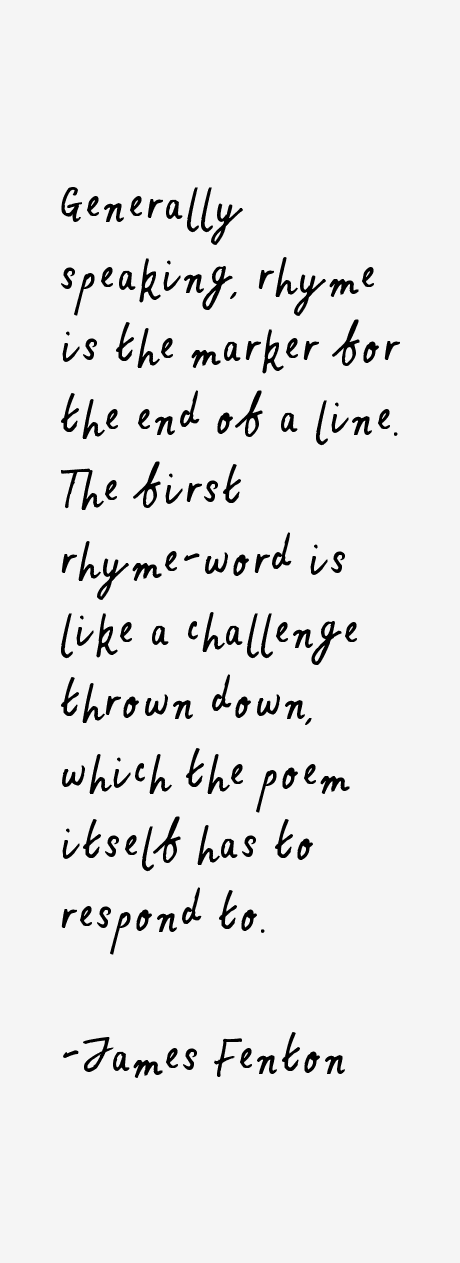James Fenton Quotes & Sayings (Page 3)
James Fenton quotes and sayings page 3 (poet). Here's quote # 21 through 30 out of the 55 we have.
“'Love' is so short of perfect rhymes that convention allows half-rhymes like 'move.' The alternative is a plague of doves, or a kind of poem in which the poet addresses his adored both as 'love' and as 'guv' - a perfectly decent solution once, but only once, in a while.”
“Poetry carries its history within it, and it is oral in origin. Its transmission was oral. Its transmission today is still in part oral, because we become acquainted with poetry through nursery rhymes, which we hear before we can read.”
“The voice is raised, and that is where poetry begins. And even today, in the prolonged aftermath of modernism, in places where 'open form' or free verse is the orthodoxy, you will find a memory of that raising of the voice in the term 'heightened speech.'”
“A glance at the history of European poetry is enough to inform us that rhyme itself is not indispensable. Latin poetry in the classical age had no use for it, and the kind of Latin poetry that does rhyme - as for instance the medieval 'Carmina Burana' - tends to be somewhat crude stuff in comparison with the classical verse that doesn't.”

“A poem with grandly conceived and executed stanzas, such as one of Keats's odes, should be like an enfilade of rooms in a palace: one proceeds, with eager anticipation, from room to room.”
“No poet is required to write in stanzas, or indeed in regular forms at all. Coleridge's 'Dejection: An Ode' has a rhyme scheme and sequence of long and short lines that goes without regular pattern, following the mood and whim of the poet. Such a form is known as an irregular ode.”
“The Italian word 'stanza' means 'a room', and a room is a good way to conceive of a stanza. A room, generally speaking, is sufficient for its own purposes, but it does not constitute a house. A stanza has the same sense of containment, without being complete or independent.”
“The term 'epitaph' itself means 'something to be spoken at a burial or engraved upon a tomb.' When an epitaph is a poem written for a tomb, and appears in a book, we are aware that we are not reading it in its proper form: we are reading a reproduction. The original of the epitaph is the tomb itself, with its words cut into the stone.”
“This is what rhyme does. In a couplet, the first rhyme is like a question to which the second rhyme is an answer. The first rhyme leaves something in the air, some unanswered business. In most quatrains, space is created between the rhyme that poses the question and the rhyme that gives the answer - it is like a pleasure deferred.”

“Generally speaking, rhyme is the marker for the end of a line. The first rhyme-word is like a challenge thrown down, which the poem itself has to respond to.”
James Fenton Quotes Rating
No Ratings Yet
Leave A Comment
























